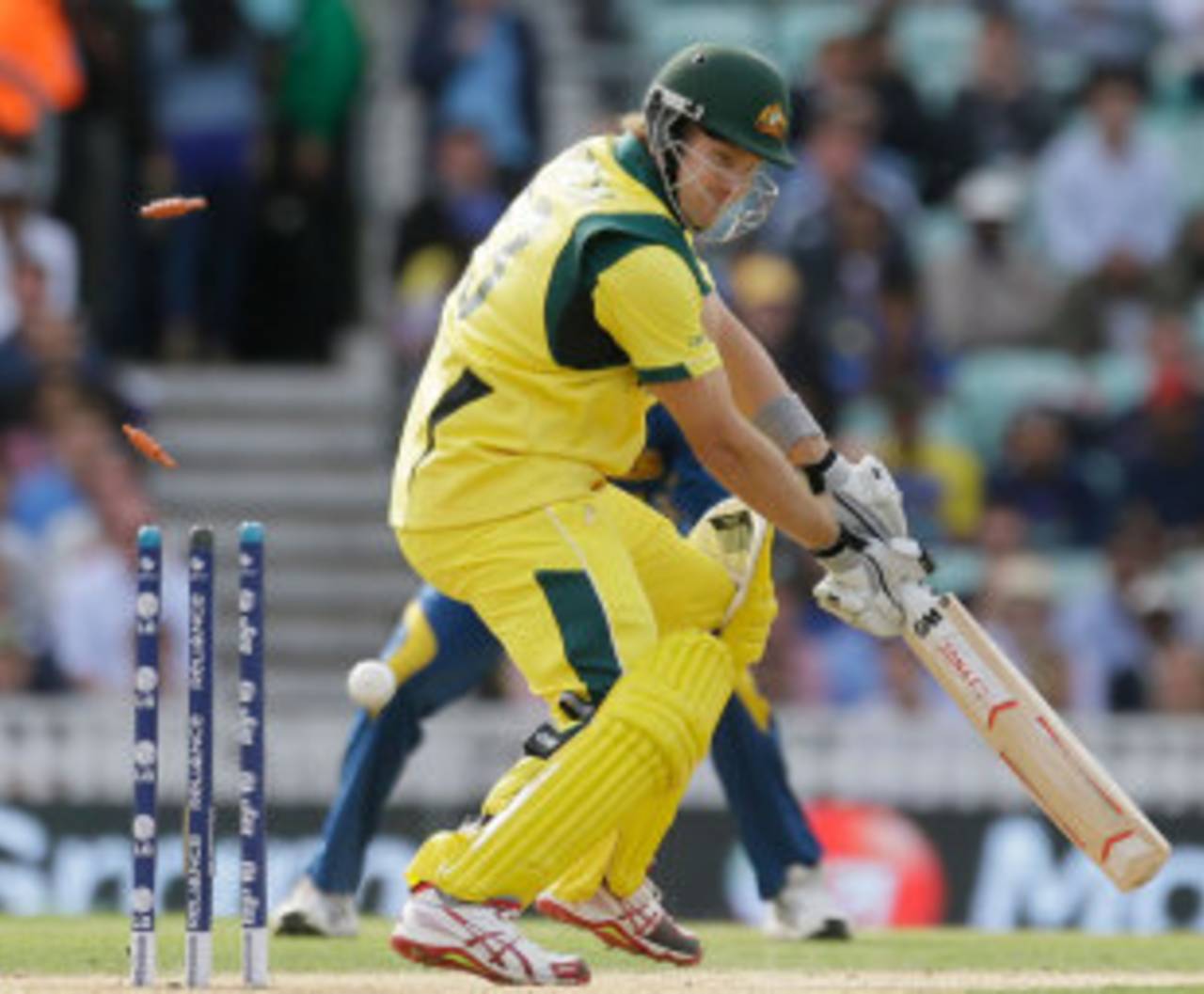In the 2009 Champions Trophy in South Africa,
Shane Watson was the Man of the Match in Australia's victories in the semi-final and the final. He also had the best average and the most centuries (two) in
the tournament. Four years on, Watson cut a much diminished figure throughout.
Just 34 runs. That's all one of the most valuable players for Australia managed in this edition of the tournament. With Michael Clarke convalescing, the burden was on Watson's shoulders to pilot Australia. It was an opportunity to correct the wrongs committed during the controversial Test series in India earlier this year where Watson was slapped with the one-match ban for not doing his homework.
Watson has not forgiven the Australian team management for rapping his knuckles, calling it the
lowest point of his career. He made it clear that he was not interested in standing as Clarke's deputy in case the occasion arose during the Ashes as he wanted only focus on how best he could help the team with his contributions.
Mentally, Watson remains vulnerable. His failure has only exacerbated Australia's problems. Undoubtedly, being the senior-most player adds to the team's expectations. But you earn your badge by rising to the occasion.
Take
Mahela Jayawardene. He had come in at a point when Xavier Doherty had tied down Sri Lanka in the middle overs. He had walked in midway into the Sri Lankan innings. Sri Lanka were 99 for 3 after 25 overs. Ten overs later they had managed just 43 more runs. But Jayawardene remained busy.
The pitch was two-paced, verging on the slower side. An elastic batsman, Jayawardene used his strengths to guide the ball into the various gaps without breaking sweat. The beauty about watching Jayawardene is he does not take the fielder on, but simultaneously he can beat any field.
Coming from round the wicket Mitchell Johnson pitched back of a length and short. Backward point and point were in position. Rooted to the crease, Jayawardene stretched laterally, opened the face of the bat, cut the ball to the left of backward point, lending just that much power required to beat Phil Hughes, who rushed in vain from third man.
Cuts, upper cuts, revere sweep, nudges, failed scoops. Jayawardene used all those weapons to make the bowler's job that much more difficult. He played the situation, using his head to put Sri Lanka in a winning position.
In contrast, Watson lost his head while attempting a stroke which has proved to be dangerous. He had started off with a fluent boundary in the first over but having just faced one ball from Nuwan Kulasekara, Watson cut; so close to his body he virtually cut the stumps. He was the most crucial batsman in the chase. Someone who could overpower their bowling. In the end Watson sat in the changing rooms head in hands, as Sri Lanka kept their nerve in a tantalising victory.
The period between 2009 and 2011 were Watson's best years. He worked hard, performed consistently and deserved the status of the most valuable player. He was in a happy state of mind. He was especially formidable in the one-day arena. You could look up to Watson and, up to a point, he would deliver. Coincidentally, it was the period when Ricky Ponting was Australia's captain. Ponting had a lot of respect for Watson and backed him in every possible situation. Watson respected Ponting for having the belief in him and standing by him.
Today Watson is isolated with Michael Clarke at the helm. He was Clarke's deputy in India, but as soon as he reached India, he made it clear he had no intention to step into the leadership duties. Watson is happy to continue making the contributions, but wants to do it on his own terms. Mickey Arthur has admitted his dynamic within the team remains a work in progress
Failing to adapt to the situation has been the major stumbling block. Disappointingly Watson has remained an impact player. Not the batsman who has the patience to construct an innings consistently. His form has declined from 2012 where onwards he has
averaged 32.05. In Twenty20 cricket, such as the IPL, Watson has expressed himself with much more freedom. He has remained the most dependable player for Rajasthan Royals since 2008. He has remained flexible in the roles he has been asked to perform in the IPL.
Australia need an assertive Watson now more than ever. Of course, the Australia team management needs to make some allowance. Clarke needs to relay the message to Watson that he remains his best man, and perhaps commit the sort of time to the allrounder that Ponting once did. For his part Watson has to realise that he cannot rely on a captain cajoling him all the time. He has the ability to stand up on his own two feet and be heard, even if recent evidence of such is growing scarce.
Nagraj Gollapudi is an assistant editor at ESPNcricinfo
